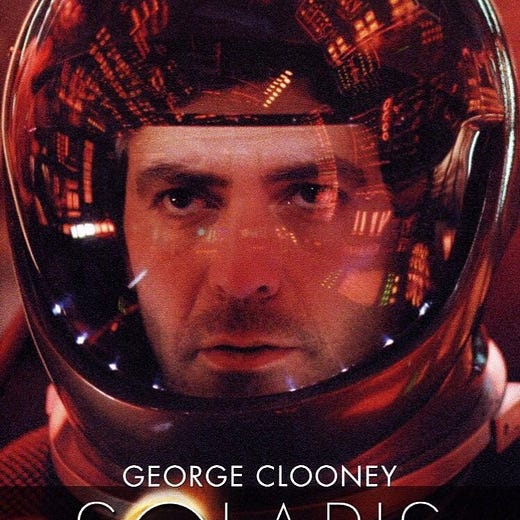Once Upon a Time...
Netflix's Blockbusters, RIP Sprint, Tardigrades, Blockbuster's Netflix, Mirror Worlds
Finally saw Once Upon a Time in Hollywood last night — thanks Megan! — and I have thoughts. Two posts worth, actually. Which I’m working on now. But quickly: I thought it was great. And yet watching it was also a bit bittersweet, as I found myself realizing we’re unlikely to see many movies like it in theaters anymore. See: below!

Netflix Splurges on Big-Budget Movies
R.T. Watson and Ben Fritz:
Netflix bought the rights to “The Irishman” after major studios passed because of concerns that it was too expensive for a drama, a genre that has struggled at the box office in recent years. The producers were in the midst of raising independent funds to make the film when Netflix entered. “Without Netflix, ‘Irishman’ would not have been made,” said one of the people close to the movie. “I just don’t see [other] studios wanting to dive into these projects any more. I think they are staying away from the riskier, more mature films, especially dramas.”
This is the natural extension of something discussed in the last newsletter: as the studios veer more towards superheroes/sequels/remakes on one end, and cheap prestige/horror flicks on the other, the “middle” fare (even when directed by Martin Scorsese!) is going to need to find a new home. And that new home is going to be the streaming services. And the “middle” is getting fatter:
Earlier this month, Netflix agreed to spend nearly $200 million to make the Dwayne Johnson action movie “Red Notice,” which will be filmed next year at exotic locations and also stars Ryan Reynolds and Gal Gadot, the people said.
…
Big action films such as “Red Notice” more frequently succeed at the box office. Comcast Corp. ’s Universal Pictures was originally set to make the movie for $150 million, but after production costs rose higher than originally planned, the studio allowed the project’s producers to shop it elsewhere, a person with knowledge of the sale process said.
Netflix is also going to release a new $150 million Michael Bay movie. So it’s not even enough to be a big-budget action movie to get into theaters. Again, it basically has to be a franchise or a remake — more of a “sure thing” to get Hollywood to take the risk.
Movies typically cost Netflix more to make than Hollywood studios, because it pays A-list actors and filmmakers more up front to compensate for the fact that it doesn’t offer a share of revenue from box-office and DVD sales, which aren’t relevant to Netflix’s business model. Those extra costs, called buyouts, totaled $14 million on “The Irishman” and $40 million on “Red Notice,” according to the people close to the pictures.
Netflix’s approach to compensation means A-list actors and directors are guaranteed more up front than at a studio, but earn less than they would have if the movie were a box-office smash. Those in Hollywood have debated whether Netflix movies make as much of a cultural impact as those released in theaters or are often lost in the shuffle on the service’s home screen.
Such economic changes will have fascinating ramifications, I imagine. Extrapolating this out: Netflix and the like become the place to go for the guaranteed payday, while the studios are the gamble on the blockbuster hit — you only get paid when they do. As a result, actors increasingly do a mixture to diversify their earning potential. A sort of new take on the one-for-them, one-for us idea (something I wondered about in the context of Netflix four years ago).
It’s Time We Say “So Long” to Sprint
Eli Blumenthal & Roger Cheng:
Most of the telecom companies you see today trace their roots back to the original Ma Bell, AT&T. But Sprint sprung from Southern Pacific Company, a railroad company that owned telegraph lines. Sprint was the catchy acronym for Southern Pacific Railroad Internal Networking Telephony. It served as Southern Pacific's entry into the long-distance calling business in 1972.
I did not realize the railway history. More importantly, a fascinating look back at failure after failure. Bad mergers, bad almost-mergers, the iPhone miss, the Palm Pre miss, WiMAX, etc, etc, etc. Almost a comedy of corporate errors. So long, Sprint.

A Crashed Spacecraft Spilled Tardigrades on the Moon
A couple newsletters ago, I also linked to a post wondering if life may not have started on Earth, but instead was spread here. You know, like this:
The lunar library on the Beresheet lander consisted of 25 layers of nickel, each only a few microns thick. The first four layers contain roughly 30,000 high-resolution images of book pages, which include language primers, textbooks, and keys to decoding the other 21 layers. Those layers hold nearly all of the English Wikipedia, thousands of classic books, and even the secrets to David Copperfield’s magic tricks.
Spivack had planned to send DNA samples to the moon in future versions of the lunar library, not on this mission. But a few weeks before Spivack had to deliver the lunar library to the Israelis, however, he decided to include some DNA in the payload anyway. Ha and an engineer on Spivack’s team added a thin layer of epoxy resin between each layer of nickel, a synthetic equivalent of the fossilized tree resin that preserves ancient insects. Into the resin they tucked hair follicles and blood samples from Spivack and 24 others that he says represent a diverse genetic cross-section of human ancestry, in addition to some dehydrated tardigrades and samples from major holy sites, like the Bodhi tree in India. A few thousand extra dehydrated tardigrades were sprinkled onto tape that was attached to the lunar library.
This craft then crashed into the moon in April. But:
The promising thing about the tardigrades, says Spivack, is that they could hypothetically be revived in the future. Tardigrades are known to enter dormant states in which all metabolic processes stop and the water in their cells is replaced by a protein that effectively turns the cells into glass. Scientists have revived tardigrades that have spent up to 10 years in this dehydrated state, although in some cases they may be able to survive much longer without water. Although the lunar library is designed to last for millions of years, scientists are just beginning to understand how tardigrades manage to survive in so many unforgiving environments. It’s conceivable that as we learn more about tardigrades, we’ll discover ways to rehydrate them after much longer periods of dormancy.
This all sounds a bit reckless. Then again, maybe such recklessness is why we’re here… It also sounds a bit terrifying. I mean, just look at those tardigrades…
Aside: how did Daniel Oberhaus miss using the title: The Moon is in Tardigrade?!
At Almost Every Decision Point, Netflix Went for Broke
A Twitter thread — based off passages from the book Netflixed — that’s worth a read. In hindsight, we look back at Blockbuster as a Goliath which blundered their way into losing to David (Netflix). And they did, but it’s not as cut-and-dry as it may seem. Blockbuster Online — which I had back in the day — was working, for one thing. And in a way that Netflix could not match with Total Access.
But then Carl Icahn started meddling…

Scientists are Searching for a Mirror Universe. It Could be Sitting Right in Front of You.
In other space news, here’s Corey S. Powell:
A decade ago, Anatoli Serebrov of Petersburg Nuclear Physics Institute in Russia introduced the idea that ordinary neutrons sometimes cross over into the mirror world and transform into mirror neutrons. At that point, we could no longer detect them — it would be as if some of the neutrons simply vanished. “That would make the neutron lifetime look wrong,” Broussard explains, because some of the neutrons would have been disappearing from the test equipment while the researchers were studying them.
Connect the dots, and you reach a far-out conclusion: The neutron experiments might look screwy because physicists unwittingly opened a portal to the mirror world.
Cool, cool. And with that, we seemingly just unified the Netflix links with the science links above. (This is actually fascinating work — or a compelling thought experiment, if nothing else.) 🤯






